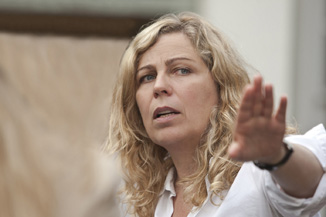|
|
BOP Interview: Lone ScherfigBy Ryan MazieAugust 17, 2011
Also, Anne is American, so she thinks of herself as a Method actress. So she needs to find the emotions within her, which is really tough when she has to… overcome horrible things in the film. She needs and wants to be behind everything. She’s a perfectionist and wants to be in control and puts very high expectations on herself. Very often I would say, “This is fine, we don’t need to shoot ten more takes, we have a very good one now,” and she would continue, “Can we please go on,” and I have never experienced anything like that before. If you work that hard, if you dance until your feet are bleeding, that’s how you become Anne Hathaway. What were the challenges of taking on such an extensive time period and condensing it into less than two hours? LS: It’s a really positive challenge; because it is something you can really only do on film. Film has such a strong relation to time and the challenge of having all of this time pass in subtle ways; sometimes humorous and sometimes understated is really a truly cinematic challenge. You can jump all that you want in time and place in film now, but you have to convey this concept and give the film a pulse. Also, to do it in a way that didn’t get annoying. I think there were 23 times you have to see, “Oh it’s July 15th.” So we had to find a lot of different ways to do it whether it is sound, score, a camera move, and hopefully it’s unpredictable. When I saw the film two days ago, I was sitting in the theater and when it said 2001, I thought, “Oh my God. They are all going to think that we have ten more years.” (laughs) And we kept experimenting with this until the very last minute so it felt elegant and light and unproblematic and effortless. If I see the film in a year, I would know, “Oh I should I have done this and that.” I can’t watch it yet. I can’t learn from it yet.
|

|
|
|

|
Monday, May 6, 2024
© 2024 Box Office Prophets, a division of One Of Us, Inc.


